February 11, 2015
Edited by David Sanders
Specimen Days
1763 – William Shenstone, English poet (b. 1714), dies.
1764 – Marie-Joseph de Chénier, French poet (Cajus Graechus), is born.
1862 – Elizabeth Siddal, British poet and artist (b. 1829), dies.
1912 – Roy Fuller, Failsworth, Lancashire, English poet/novelist (Lost Season), is born.
1963 – Sylvia Plath, American poet/novelist (Ariel), commits suicide at 30.
1996 – Amelia Rosselli, poet, dies at 65.
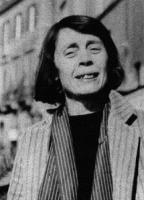
Lifting of weights and particularities of fate
little doves eyed my strength
taken from your take-off like
candy, the vocation melted into
a semantic revision of our quarrels
and birds. None of the soldiers who really
wanted to remarry was able to tell me
who is it that really marches.
—from “Serie Ospedaliera” by Amelia Rosselli (1930–1996)
“None of the soldiers who really / wanted to remarry was able to tell me / who is it that really marches.” – Amelia Rosselli
World Poetry
Statue of Russian Poet Alexander Pushkin Snatched by Thieves in Moscow
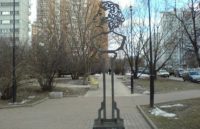
In a country where poet Alexander Pushkin is worshiped as a literary god, stealing a monument in his honor is to be considered nothing short of blasphemy. Yet that's exactly what happened over the weekend, when a group of unknown hoodlums seized a bronze statue of Pushkin from a square in north-western Moscow. District authorities said Saturday in an online statement that the vandals had most likely removed the monument to sell for scrap metal.
Guizhou: Police Target Protesters Calling for Release of a Poet Close to Occupy Central
The authorities of Guizhou Province, in southwest China, have made a series of raids against activists of a pro human rights group, for having gathered in public, sympathized with and promoted a fundraiser for poet Wang Zang. He has been in prison since last October for supporting the Hong Kong pro-democracy movement Occupy Central. According to reports from the activist Li Renke, interviewed by Radio Free Asia (RFA), now the group of friends, colleagues and activists of Guizhou has come under fire from the communist government, accused of having "broken safety laws “.
In Russia, where poet Alexander Pushkin is a literary god, stealing a statue in his honor is blasphemy.
Recent Reviews
Get Lost
by Dana Levin
To fathom Caroline Bergvall's Drift, you must voyage through the book twice, along two profitable paths: the lost way and the lit way. The lost way begins with the inside jacket, the only useful context if you are going to read the book from beginning to end: "Due North / following / a medievel sea poem / a contemporary sea drift / an aircraft surveillance image / a forensic report / a runic sign." The lit way, which illuminates Drift’s methods and madness, doesn’t begin until sixty pages before the end. Only at the book’s conclusion does Bergvall provide sources and a table of contents. She saves orientation for last.
On Jake Adam York’s ‘Abide’
by Tess Taylor
Jake Adam York was a big, bald white man from a working class family who wrote forcefully about memory and mis-memory in Southern life. His poems were cut with beauty and sorrow: they retraced the trauma and violence of the civil rights movement, both in York’s Alabama and beyond. This project might have fallen flat in the wrong hands, but in his work, York managed to chart new and self-aware ways of writing about whiteness, about the state of being white in a world where race is painful, political, and far from neutral. His work not only charted this path for other poets, but carried itself with heart-opening grace. And two days before his death in 2012, Jake Adam York handed in the manuscript for his last book.
Christian Wiman’s ‘Once in the West’ and Mary Oliver’s ‘Blue Horses’
by Steven Ratiner
It is perhaps the contemporary poet’s most difficult challenge: to write convincingly in our secular era about the spiritual life. Pitfalls abound: Rely too heavily on traditional religious language and you end up literally preaching to the choir; wade too deeply into the wilds of idiosyncratic visions and you risk being wholly inaccessible. But poets Christian Wiman and Mary Oliver have each gained a loyal following by not shying away from this elusive territory. In their new collections, we witness very different stylistic approaches and journeys.
The Now Is Falling
Kathleen Ossip’s poetry delights in the imperfect present.
by Jonathan Farmer

“[T]here are things that are important beyond all this fiddle” wrote Marianne Moore, meaning, by “fiddle,” poetry. It’s worth taking the claim with a grain or 10 of salt: She writes it in a poem; the poem is called “Poetry”; it turns out, to no one’s surprise, to be a defense of the art. Still, I like the line: its plainness, its plain accuracy, the description of poetry as “fiddle”—as in, fiddling around—and the implied presence there of the person who would use a phrase like “all this fiddle” in the first place, someone with neither time nor patience for wasteful activity but who still has, somehow, room for a little playing around with words. That little wink. It feels spacious, right.
On Swimming in the Rain: New and Selected Poems 1980-2015
Truth in the Poetry of Chana Bloch
by Dara Barnat
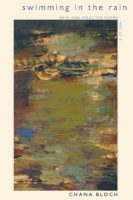
Chana Bloch’s distinguished oeuvre spans decades: The Secrets of the Tribe (Sheep Meadow Press, 1980), The Past Keeps Changing (Sheep Meadow Press, 1992), Mrs. Dumpty (Wisconsin Press, 1998), and Blood Honey (Autumn House Press, 2009). In addition to her poetry, Bloch has translated The Song of Songs (with Ariel Bloch), as well as collections of poetry by Yehuda Amichai and Dahlia Ravikovitch. Bloch has received the Di Castagnola Award from the Poetry Society of America, two Pushcart Prizes, fellowships from the National Endowment for the Arts, and other prestigious awards. Now Bloch’s beautiful, poignant poems appear together in Swimming in the Rain: New and Selected Poems 1980-2015 (Autumn House Press, 2015).
Kathleen Ossip’s poetry delights in the imperfect present.
Broadsides
Orality, Literacy, and the Memorized Poem
by Mike Chasar
Partway through Francis Ford Coppola’s 1983 film adaptation of S.E. Hinton’s 1967 novel The Outsiders, Ponyboy Curtis (played by C. Thomas Howell) and Johnny Cade (Ralph Macchio) are hiding out in an abandoned church in the country because Johnny knifed and accidentally killed a guy in a late-night fight. In the church, separated from the pain and gang violence of their low-income lives, the teens can be most fully themselves, and they spend their time reading Gone with the Wind to each other as they wait for Dallas (Matt Dillon) to show up and say the coast is clear. One morning, the blond-haired and poetically-inclined Ponyboy gets up early and watches the sunrise through the mist. He is joined by Johnny, who remarks, “Too bad it can’t stay like that all the time.” Ponyboy responds, “Nothing gold can stay,” and proceeds to recite in full Robert Frost’s well-known poem of the same title.
The Poet Tasters
by Ben Etherington
The Geraldine Pascall Prize for Australian Critic of the Year has been awarded on 25 occasions, each time by a panel of eminent critics, often themselves past winners. It has gone to critics known for their reviewing of fiction (7), film (5), music (3, including once shared), theatre (2), art (2), architecture (1), food and wine (1) and to reviewers-at-large (3). The first award went to David Malouf before it was decided that the prize should be specialised for criticism. Not once has it gone to a critic known principally for poetry reviewing.
The Geraldine Pascall Prize for Australian Critic of the Year has never been awarded to a poetry critic.
Drafts & Fragments
Why Are Poets' Voices So Insufferably Annoying?
by Matt Petronzio
When I was in grad school I'd meet my thesis advisor, Catherine, on Tuesday nights at a café on New York's Upper West Side. We'd sit together at a small table, where she'd have me read my fresh, newly written poems out loud. It was an exercise to hear how the poems sounded, a way to help pinpoint any hiccups in the rhythm, line breaks and so on. (It also taught the regular café-goers that, yes, poets gather over black tea and read poems about death, just like you imagined.) One particular night, I started reading a new poem — but I only got through two lines before Catherine stopped me. "Don't read it like it's a poem," she said. "Read it like you're talking to me." In other words, read like a human.
The Drive-By Poetry Wars of Prague Tomorrow
by John Kendall Hawkins
Ever since it was announced that old Praha would be allowing, would be installing, would be promoting poetry machines throughout the city, dark elements of the Republic, controllers and others all souped up on Prosaic (sic, real sic), have been fomenting to take back the narrative line from the mad semiotics of lyricists and closet bards out pimpin’ the night with scheming rhymes, pent-up meters, and broken lines. O with their broken lines. “It’s one more indictment of the hard drinkin’ Zeman,” some citizens say. “She walks in beauty like the night, but not on my watch, not in my firmament. Sto ho stay away.”
Nine-year-old Somehow Writes One of the Darkest Poems of All Time
The Los Angeles Times recently published a selection of poems sent in by children in its ‘creativity corner’.
The Los Angeles Times recently published a selection of poems sent in by children.
Poetry In the News
Controversy Over, NC Poet Laureate Shelby Stephenson Installed
On a day given over to poems and poets, it was a politician who came up with the most memorable line at Monday’s poet laureate installation ceremony. Looking out at the crowd assembled in the historic State Capitol to honor new poet laureate Shelby Stephenson, Gov. Pat McCrory said he wanted to “say something that’s not scripted.” “I’ve learned my lesson,” McCrory said to laughter and applause. “It’s been a learning process for me, too.”
Undocupoets Working to Open Contests to Undocumented Poets

Marcelo Hernandez Castillo, an undocumented immigrant from Mexico and an aspiring poet, realized during his teens years that the experience of poetry in the United States was not as accessible to him as it was to his peers who held citizenship. Interested in pursuing the craft, Hernandez Castillo began researching prizes and publishing contests, but he found that “a lot of the contests and presses require citizenship,” according to an article at Fusion.net. Now, several years later, Hernandez Castillo has legal U.S. residence, and he’s sharing his experience to bring awareness to this issue affecting undocumented writers. The poets Javier Zamora and Christopher Soto have been working with Hernandez Castillo to affect change, and they have created a group called the Undocupoets.
Juice Drink Brand Teams With Spoken Word Poet & Orchestra For Delicious Mashup
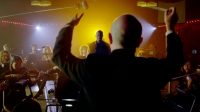
Britvic, maker of the popular UK soft drink J2O, teamed with digital agency TH_NK to launch a month-long partnership with spoken word poet James Massiah and the Royal Philharmonic Concert Orchestra. The campaign, There’s Joy in the Blend, is comprised of 20 videos which will be released each business day during the month of February. The videos will feature Massiah doing his spoken word poetry thing accompanied by the Philharmonic Orchestra.
Marcelo Hernandez Castillo is sharing his experience to bring awareness to issues affecting undocumented writers.
New Books
The Weary Blues by Langston Hughes
[Hardcover] Knopf, 128 pp., $26.00

Nearly ninety years after its first publication, this celebratory edition of The Weary Blues reminds us of the stunning achievement of Langston Hughes, who was just twenty-four at its first appearance. . . .In a new introduction to the work, the poet and editor Kevin Young suggests that Hughes from this very first moment is “celebrating, critiquing, and completing the American dream,” and that he manages to take Walt Whitman’s American “I” and write himself into it. We find here not only such classics as “The Negro Speaks of Rivers” and the great twentieth-century anthem that begins “I, too, sing America,” but also the poet’s shorter lyrics and fancies, which dream just as deeply.
Domestic Garden by John Hoppenthaler
[Paperback] Carnegie Mellon, 80 pp., $15.95
In his third collection of poetry, John Hoppenthaler surveils the remnants of an American Dream. What devotion might mean and look like in our time is at the book’s heart. The poems, written in a variety of styles, offer testimony and uncover, row by row, what remains viable in a garden they hope to resurrect.
Trio by Sarah Tolmie
[Paperback] McGill-Queen's University Press,136 pp., $14.95
A collection of 120 sonnets in eight parts, Trio reveals, frame by frame, a married fortysomething female narrator in love with two younger men – an intellectual and a dancer – and torn between the claims of body and mind. In the tradition of Renaissance sonnet sequences from Petrarch onward, the narrator's love objects are constantly before her eyes, and thus before ours, creating compassion, comedy, and desire. They are real and imaginary, opposite and complementary, present and unavailable, autonomous and dependent. Tolmie's characters circle and shadow one another in every dance, spinning until fantasy becomes flesh and entanglement. In immortalizing the beloved, she draws on the power of both poetic and human reproduction.
Bartram's Garden by Eleanor Stanford
[Paperback] Carnegie Mellon, 88 pp., $15.95
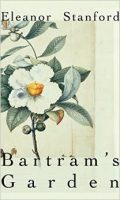
From Brazil’s Bay of All Saints to Philadelphia, from Florida’s brutal humidity to the drought-scorched Cape Verde Islands, Bartram’s Garden takes in the pulse and ache of the natural world: the bittern balanced in the swamp, cashew fruit’s astringent flesh. With a gardener’s eye for color and motif, and a mother’s open-hearted sensibility, these poems explore vivid landscapes both intimate and foreign.
I'm here to learn to dream in your language by H. L. Hix
[Paperback] Etruscan Press, 103 pp., $17.00
In lyric sequences that record a lover's dreams and a dreamer's loves, I'm here to learn to dream in your language extends H. L. Hix's ongoing poetic inquiry into spiritual and sexual ecstasy.
Times Beach by John Shoptaw
[Paperback] University of Notre Dame Press, 144 pp., $24.00
Winner of the Notre Dame Review Book Prize, this ambitious collection of poems evokes the cultural and environmental history of the Mississippi watershed and meditates on how its rivers are ceaselessly shaping, and shaped by, the lives around them. John Shoptaw guides us from the Mississippi’s headwaters in Lake Itasca to its delta in the Gulf of Mexico, weaving together episodes in the life of the river system—the New Madrid earthquakes, the 1927 flood, the EPA’s eradication of the dioxin-laced town of Times Beach—with his own memories of growing up in the Missouri Bootheel: picking cotton, being baptized in a drainage ditch, and working in a lumber mill. Formally renovative, the poems in Times Beach ring the changes on the big muddy place and hymn its everlasting possibilities.
Open Heart: Poems by Thomas Brush
[Paperback] University of Washington Press, 98 pp., $16.95
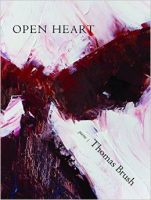
Tough, direct, filled with sweetness and immaculate detail, the poems in Open Heart do what only the best poems do, they link the reader with previously unsuspected aspects of his or her own sensibility. They remind us what life has been like for the post-war generation in America, and they show us where hope, laughter, and genuine feeling abide.
A new edition of The Weary Blues reminds us of the stunning achievement of Langston Hughes.
Correspondences
The Post-Šalamunian Period
by André Naffis-Sahely
I had written to tell Tomaž Šalamun he’d changed my life—thanks to him, I’d begun to put down roots in a new continent, and met the woman I was going to marry. I had at least assumed I could take him out to dinner on his next visit to the U.S. The letter went unanswered for a couple of weeks and then a reply materialized in my inbox. “With my last strength I greet you,” he wrote, dictating the letter to his wife, the painter Metka Krašovec, “enjoy the States, I think this is the best place for you.” Five weeks later, on December 27, 2014, Šalamun passed away in his beloved Ljubljana.
Poet Timothy Liu Discusses Coming Out, Mormonism, and Non-Possessive Love
by Phillip M. Miner

After reading Timothy Liu's latest book of poetry, Don't Go Back to Sleep, I knew I had to interview him immediately. We met for soup in Chinatown and talked about poetry, coming out as a Mormon, and non-possessive love. Our thirty-minute conversation ended and Timothy looked at me a little panicked from across the table, "Wait….did we even talk about poetry?" I couldn't remember either, but knew what we did discuss would make a damn good read.
Poet Timothy Liu discusses coming out, Mormonism, and non-possessive love.
Envoi: Editor’s Notes
Love and Other Crimes
by Brendan Boyle
‘No estates, no psychotherapy, no interview, no history—I just make it up.” That was the late Diane Middlebrook’s response to the question why she, the author of celebrated biographies of the poets Sylvia Plath, Ted Hughes and Anne Sexton, and the jazz musician Billy Tipton, decided to write one of Ovid.
–––––––––––––––––––––––––––––––––––––––––––––––––––––
Quoting Diane Middlebrook
by Cynthia Haven
Brendan Boyle has written a review of Diane Middlebrook’s posthumous Young Ovid for the Wall Street Journal here, in a piece titled “Love and Other Crimes.” (And I’ve written about the book here and here.) My attention was immediately drawn to it because it leads with a line from my obituary for the celebrated biographer – here. The quote was taken from the unpublished bits of an interview I did with her in 2003, for my Stanford Magazine interview here. Since obituaries typically aren’t chatty and first person-y, I didn’t mention my 2003 interview, and simply quoted her.
Diane Middlebrook on writing a biography of Ovid: “No estates, no psychotherapy, no interview, no history—I just make it up.”